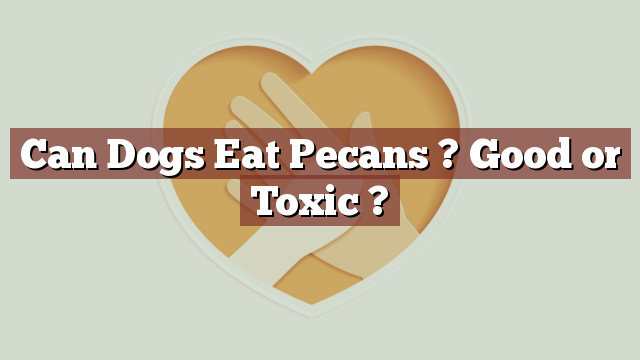Can Dogs Eat Pecans? Good or Toxic?
As pet owners, it is important for us to be aware of what foods are safe for our furry friends to consume. While some foods are perfectly fine for dogs, others may pose potential risks to their health. In this article, we will explore whether dogs can eat pecans and whether pecans are good or toxic for them.
Nutritional Value of Pecans: A Rich Source of Nutrients for Humans
Pecans are not only delicious but are also packed with nutrients that provide various health benefits to humans. They are an excellent source of healthy fats, dietary fiber, and protein. Additionally, pecans are rich in vitamins and minerals such as vitamin E, vitamin A, magnesium, and manganese. These nutrients contribute to a healthy heart, aid digestion, and support overall well-being.
Can Dogs Eat Pecans? Exploring the Safety of Pecans for Dogs
Dogs should not eat pecans as they can be harmful to their health. Pecans contain a toxin called juglone, which is found in the leaves, husks, and shells of the nut. While the toxin is not present in large quantities in the actual nut meat, it can still cause gastrointestinal upset in dogs. In some cases, consumption of pecans may even lead to pancreatitis, a potentially life-threatening condition for dogs.
Furthermore, pecans are high in fat content, and feeding them to dogs can contribute to weight gain and obesity. This can lead to a range of health issues, including joint problems and increased risk of heart disease.
Potential Risks and Benefits of Dogs Consuming Pecans
The risks associated with dogs consuming pecans outweigh any potential benefits. While pecans provide valuable nutrients for humans, dogs have different dietary needs. The potential risks, such as gastrointestinal upset and pancreatitis, make it important to avoid feeding pecans to dogs altogether.
My Dog Ate Pecans, What Should I Do? Steps to Take for Dog’s Health
If your dog accidentally consumes pecans, it is essential to monitor their behavior and overall health. Look out for symptoms such as vomiting, diarrhea, abdominal pain, lethargy, or loss of appetite. If any of these symptoms occur, it is crucial to contact your veterinarian immediately for guidance and potential treatment.
It is worth noting that preventing access to pecans and other potentially harmful foods is the best course of action. Being vigilant and keeping these foods out of reach can help ensure the well-being of your furry friend.
Conclusion: Exercise Caution, but Occasional Pecan Consumption Is Safe for Dogs
In conclusion, dogs should not eat pecans due to the potential risks they pose. The presence of the toxin juglone and the high-fat content make pecans unsafe for dogs. It is vital to prioritize their well-being and provide a diet that is suited to their specific needs.
While occasional pecan consumption may not cause immediate harm, it is best to avoid feeding them to your dog altogether. Instead, focus on providing a balanced and nutritious diet that is formulated for canine health. Always consult with your veterinarian if you have any concerns about your dog’s diet or if they have consumed a potentially harmful food. Your veterinarian can provide personalized advice and guidance to ensure your furry companion stays happy and healthy.
Thank you for investing your time in exploring [page_title] on Can-Eat.org. Our goal is to provide readers like you with thorough and reliable information about various dietary topics. Each article, including [page_title], stems from diligent research and a passion for understanding the nuances of our food choices. We believe that knowledge is a vital step towards making informed and healthy decisions. However, while "[page_title]" sheds light on its specific topic, it's crucial to remember that everyone's body reacts differently to foods and dietary changes. What might be beneficial for one person could have different effects on another. Before you consider integrating suggestions or insights from "[page_title]" into your diet, it's always wise to consult with a nutritionist or healthcare professional. Their specialized knowledge ensures that you're making choices best suited to your individual health needs. As you navigate [page_title], be mindful of potential allergies, intolerances, or unique dietary requirements you may have. No singular article can capture the vast diversity of human health, and individualized guidance is invaluable. The content provided in [page_title] serves as a general guide. It is not, by any means, a substitute for personalized medical or nutritional advice. Your health should always be the top priority, and professional guidance is the best path forward. In your journey towards a balanced and nutritious lifestyle, we hope that [page_title] serves as a helpful stepping stone. Remember, informed decisions lead to healthier outcomes. Thank you for trusting Can-Eat.org. Continue exploring, learning, and prioritizing your health. Cheers to a well-informed and healthier future!

